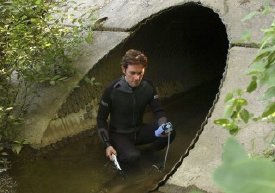Mar 10 2010
Marc Edwards and Simoni Triantafyllidou of Virginia Tech’s College of Engineering, along with colleague Dr. Dana Best of Children’s National Medical Center, published a 2009 article in Environmental Science and Technology (ES&T) that demonstrated a major increase in childhood lead poisoning of Washington D.C. children during the 2001-2004 lead-in-water crisis. The research contradicted years of government assertions that no residents in Washington D.C. had been harmed by years of unnecessary exposure to very high levels of lead in their potable water.
 Marc Edwards, Virginia Tech professor of civil and environmental engineering, is the recipient of the Editor’s Choice Award for Best Science Paper of 2009 in Environmental Science and Technology (ES&T) for his investigative work that demonstrated a major increase in childhood lead poisoning of Washington D.C. children during the 2001-2004 lead-in-water crisis.
Marc Edwards, Virginia Tech professor of civil and environmental engineering, is the recipient of the Editor’s Choice Award for Best Science Paper of 2009 in Environmental Science and Technology (ES&T) for his investigative work that demonstrated a major increase in childhood lead poisoning of Washington D.C. children during the 2001-2004 lead-in-water crisis.
These discoveries prompted investigations by Congress and the D.C. Office of Inspector General into potential wrong-doing by the government agencies that made the claims.
ES&T has now selected the paper written by Edwards of Blacksburg, Va., Triantafyllidou of Veria, Greece, and Best of Washington, DC, as the Editor’s Choice Award for Best Science Paper of 2009, and is presenting the award today. ES&T publishes nearly 1500 papers annually.
The Virginia Tech research on lead in water is already internationally recognized. In 2007, Edwards was one of the 24 recipients of a 2007 McArthur Fellow award with a cash prize of $500,000. The award specifically cited him for “playing a vital role in ensuring the safety of drinking water and in exposing deteriorating water-delivery infrastructure in America’s largest cities.”
http://www.macfound.org/
site/c.lkLXJ8MQKrH/b.2913825/apps/nl/content2.asp?content_id={98B6202C-16A6-480D-B33F-3A9ACCC9EC3D}¬oc=1
Likewise, Triantafyllidou’s master’s thesis work on the subject was awarded first place in the nation by the Association of Environmental Engineering and Science Professors, and also by the American Water Works Association.
Edwards’ investigative work is also earning him Villanova University’s Praxis Award in Professional Ethics on April 12.
“Marc Edwards was selected by the Praxis Award Committee because of his exemplary dedication to the ethical ideals of his profession as an engineer,” said Mark Doorley, director of Villanova’s Ethics Program. “Out of a concern for the public welfare, a central value of the engineering profession, Professor Edwards pursued what he thought was a highly dangerous claim about lead in the water of Washington, D.C.
The Villanova awards committee further stated: “Despite many obstacles, including the risk of speaking out against friends and colleagues, Edwards demonstrated great moral courage in alerting the public to the extent of the deception and dangers at hand. Edwards’ subsequent investigation uncovered a variety of unprofessional and unethical practices by the Centers for Disease Control, independent research groups and the D.C. Water and Sewer Authority.”
As background, in 2003-2004, while investigating the Washington, D.C. area’s water supply, Edwards and his graduate students discovered that the addition of chloramine disinfectant in tap water increased the incidence of lead leaching in residential and commercial aqueducts. Later work linked several cases of lead poisoning, earlier thought to be caused by lead paint, to local tap water, in direct contradiction to sworn testimony by health department officials. The discoveries led to a series of investigative reports in ES&T and Salon by freelance reporter Rebecca Renner.
Concerned with a potential cover-up by the health agencies, Edwards and Triantafyllidou began to collaborate with Dr. Best and Children’s National Medical Center (CNMC), who had maintained records on childhood lead poisoning that were independent of the official records maintained by Washington D.C. and the Centers for Disease Control. Their evaluation revealed that the government agencies inexplicably “lost” thousands of blood lead records, including hundreds of records of lead poisoned children from 2003. Moreover, a scientific evaluation of the data maintained by CNMC, showed much higher incidence of lead poisoning that could be linked to the high lead in water. Approximately 42,000 of Washington D.C. children from 2001-2003 were highly vulnerable to neurological harm from the lead in water.
In February of 2009, a class action lawsuit was filed, suing the D.C. Water and Sewer Authority for $200 million. The plaintiff, a single father, claimed lead-contaminated tap water poisoned his twin sons as infants, causing them ongoing health problems.
Edwards came to Virginia Tech in 1997 from the University of Colorado at Boulder, where, in 1996, the National Science Foundation (NSF) selected him as one of only 20 young engineering faculty in the nation to receive a Presidential Faculty Fellowship. In 2004 Time magazine dubbed Edwards “The Plumbing Professor” and featured him as one of 4 innovators in water research from around the world.
http://www.cee.vt.edu/index.php?
do=view&content=0&apps=2&level=2&id=17&pid=927d7092eb2aad90ce864f9550609736
Edwards has a master’s degree and Ph.D. in environmental engineering from the University of Washington and earned his bachelor’s degree in bio-physics from the State University of New York at Buffalo. Triantafyllidou joined Virginia Tech from the highly regarded Technical University of Crete (in Greece) and completed her M.S. in 2006. She is continuing her M.S. work on lead in drinking water with Edwards.